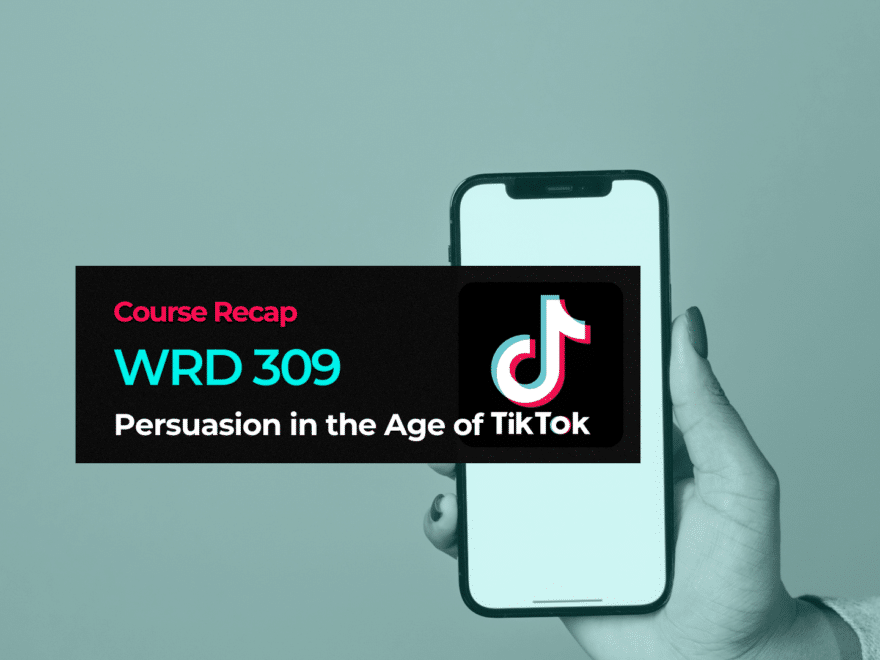Last year, we chatted with Professor Margaret Poncin Reeves about her upcoming course WRD 309: Persuasion in the Age of TikTok. Now that the course has ended, we wanted to share a recap from students’ perspectives as well.
Here two students, education major NIna Odishoo and WRD major Miranda Kincer, share their perspective on this fasicnating course.
Why did you decide to take this course?
Nina: I decided to take this course to fill a requirement, but I did have the choice to pick a few WRD courses. This one in particular intrigued me due to its title, as I find the use of social media to be heavily embedded in civic issues. I was interested in how social media affects political discourse, and towards the end of this class, I understood how imperative it is to be aware of the continuous cycle that social media contributes to polarization in the U.S.
Miranda: I took this course because I have taken Dr. Reyes’ Argumentative Writing course, and I thought it would be interesting to see how argumentation applies to social media. I think social media literacy is extremely important for writing students because the medium changes the way that people participate with written text as readers (and responders).
Do you have a favorite reading, project, or lesson from the course?
Nina: It would be so hard for me to pick a specific reading in this course, but I indeed have a favorite concept/project. I found the use of rhetorical empathy to be extremely intriguing, and Margaret definitely opened a door for me by introducing us to this concept. My final project was about the discourse of misogyny/misandry online, centered around the practice of using rhetorical empathy as the foundation for dissecting this topic. Through this, I was able to identify how the double standards of femininity and masculinity have negatively impacted an entire demographic of people (men), and how misandry is merely the byproduct of misogyny. I realized that both misogynists and misandrists feed off of eachother, creating extreme tensions and causing feminism to backtrack. I loved this project because it truly challenged my beliefs, and it was difficult for me to put myself in the position to be receptive to changing my stance on the discourse of femininity and masculinity.
Miranda: My favorite assignment was our final project, where we created a social media post and justified our rhetorical choices in that post. We studied the social contract, rhetorical listening and empathy, and what features of social media mediums cause political division. Our posts let us apply what we learned in the course to create a post that would hopefully speak to an important issue without alienating the other side.
Were there any aspects of WRD 309 that surprised you?
Nina: Some aspects of WRD 309 that surprised are centered around the severity of polarization regarding political discourse. Margaret perfectly planned the class to build the foundation of understanding what the social contract is, bringing us back to readings from the 1600s (Hobbes and Locke) to analyze what the state of nature is from a very formal, raw perspective. This course started from scratch and layered concepts that ultimately contributed to a well-rounded, educated perspective where we can look at the cause of polarization and how it impacts society today. I did not expect the use of the social contract to be so legitimate in a way, but it truly tied everything together by the last week of class as I turned in my final project.
What are your biggest takeaways?
Nina: My biggest takeaways would most definitely be the practice of rhetorical empathy. To be quite honest, I came into this class with a lot of hatred in my heart toward people who have differing opinions than me. I did not realize that my own beliefs were holding so much tension in my body, making it difficult, if not impossible, to have a civil conversation with anyone who disagreed with me. The use of rhetorical empathy has taught me to listen to understand, not to respond. It has also taught that people have equally strong opinions as me, and going into a conversation with the goal of changing someone’s mind by being aggressive is not an effective way to conduct a mature conversation. I understand more than anyone because I was that person who would not budge. Rhetorical empathy has allowed me to actually have these difficult conversations, ones that would have made me physically ill to have 6 months ago. I sense the growth and change in the way I go about my opinions, and it honestly has brought a lot of peace to my life. The beauty of rhetorical empathy is that it could be applied to any aspect of your life, not just political discourse. It is an extremely proactive skill to have, and I could not be more thankful for having the opportunity to learn about it.
Miranda: My biggest takeaway from this course is that no matter how divided people seem to be, we have more similarities than differences. Social media is probably not the best place to have productive conversations, but if our conversations must exist on social media, we must keep in mind that most people just want to feel heard. Extending that grace can be the difference between radicalization and unity.
